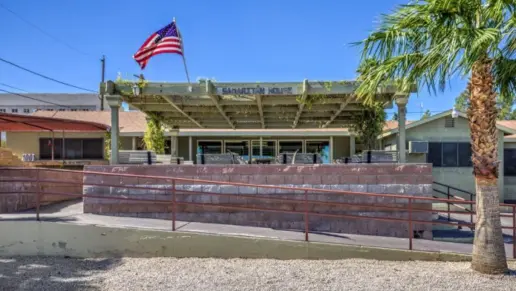About Rural Nevada Counseling
Located in Silver Springs, Nevada, Rural Nevada Counseling provides outpatient behavioral health and substance abuse treatment. They specialize in assisting residents of rural communities who may have limited access to high quality care. They offer a sliding scale schedule based on income and family size but no one is denied treatment because they can’t pay. Their mission is to provide and promote life changing support for the residents of or near Lyon County.
They offer a range of services including group and individual therapy, couples therapy, and family therapy. Their treatment team consists of experienced therapists, support staff, licensed psychologists, social workers, and counselors. These services are available in a supportive, safe environment so clients are comfortable sharing their feelings.
Medication assisted treatment may be used in combination with therapy and counseling to provide a whole person approach to addiction recovery for those who are dependent on alcohol or opioids. All medications are approved by the FDA and treatment plans are customized to meet each client’s unique needs.
They also offer workshops, community events, and outreach programs so that everyone has resources and information regarding mental health and well-being. The goal is for clients in these rural communities to have the tools and resources necessary to live their best lives.
Accepted Insurance
Other Forms of Payment
Private insurance refers to any kind of healthcare coverage that isn't from the state or federal government. This includes individual and family plans offered by an employer or purchased from the Insurance Marketplace. Every plan will have different requirements and out of pocket costs so be sure to get the full details before you start treatment.
Self-pay involves paying for treatment out of your own pocket. You can use savings or credit, get a personal loan, or receive help from family and friends to fund your treatment. If you don't have insurance or your insurance plan doesn't cover a specific program, self-pay can help ensure you still get the care you need.
Financial aid can take many forms. Centers may have grants or scholarships available to clients who meet eligibility requirements. Programs that receive SAMHSA grants may have financial aid available for those who need treatment as well. Grants and scholarships can help you pai for treatment without having to repay.
Sliding scale payments are based on a client's income and family size. The goal is to make treatment affordable to everyone. By taking these factors into account, addiction recovery care providers help ensure that your treatment does not become a financial burden to you or your family, eliminating one barrier to care.
Medicaid is a state based program that helps lower-income individuals and families pay for healthcare. Medicaid covers addiction treatment so those enrolled can use their coverage to pay for rehab. When a program accepts Medicaid the client often pays very little or nothing out of their own pocket.
Addiction Treatments
Levels of Care
Treatments
The goal of treatment for alcoholism is abstinence. Those with poor social support, poor motivation, or psychiatric disorders tend to relapse within a few years of treatment. For these people, success is measured by longer periods of abstinence, reduced use of alcohol, better health, and improved social functioning. Recovery and Maintenance are usually based on 12 step programs and AA meetings.
When you enter drug rehab in Nevada, you receive professional assistance to remove drugs from your body and cease your body's need for the substance. You learn coping strategies and receive support to prevent relapse and enjoy long-term sobriety.
A combined mental health and substance abuse rehab has the staff and resources available to handle individuals with both mental health and substance abuse issues. It can be challenging to determine where a specific symptom stems from (a mental health issue or an issue related to substance abuse), so mental health and substance abuse professionals are helpful in detangling symptoms and keeping treatment on track.
Opioid rehabs specialize in supporting those recovering from opioid addiction. They treat those suffering from addiction to illegal opioids like heroin, as well as prescription drugs like oxycodone. These centers typically combine both physical as well as mental and emotional support to help stop addiction. Physical support often includes medical detox and subsequent medical support (including medication), and mental support includes in-depth therapy to address the underlying causes of addiction.
Programs


Clinical Services
Substance abuse counselors may apply cognitive behavioral therapy in Nevada during individual, family, or group sessions. Using a goal oriented approach, the therapist will help participants change negative thinking and behavioral patterns to address substance use and related challenges.
If you're experiencing substance use disorder, dialectical behavior therapy in Nevada can help you reduce cravings, learn healthier ways to manage stress, and avoid situations that can lead to substance abuse. Treatment includes one on one sessions with your therapist as well as group sessions to practice the skills you're learning.
Group therapy is any therapeutic work that happens in a group (not one-on-one). There are a number of different group therapy modalities, including support groups, experiential therapy, psycho-education, and more. Group therapy involves treatment as well as processing interaction between group members.
In individual therapy, a patient meets one-on-one with a trained psychologist or counselor. Therapy is a pivotal part of effective substance abuse treatment, as it often covers root causes of addiction, including challenges faced by the patient in their social, family, and work/school life.
Research shows that motivational interviewing is an effective approach for individuals who are unprepared for change. They may be resistant to change or simply insecure in their abilities to make changes. This therapeutic method allows clients to explore their options, reach their own conclusions, and feel empowered to make changes.
Trauma therapy uses trauma focused care to help you understand and manage your emotional and physical responses. Using therapeutic interventions, you learn to reframe the experience. This helps to reduce your anxiety and build your resilience to face future challenges and gain control over your life.
Whether a marriage or other committed relationship, an intimate partnership is one of the most important aspects of a person's life. Drug and alcohol addiction affects both members of a couple in deep and meaningful ways, as does rehab and recovery. Couples therapy and other couples-focused treatment programs are significant parts of exploring triggers of addiction, as well as learning how to build healthy patterns to support ongoing sobriety.
Research clearly demonstrates that recovery is far more successful and sustainable when loved ones like family members participate in rehab and substance abuse treatment. Genetic factors may be at play when it comes to drug and alcohol addiction, as well as mental health issues. Family dynamics often play a critical role in addiction triggers, and if properly educated, family members can be a strong source of support when it comes to rehabilitation.
Developing life skills supports your social, psychological, and physical well being. These skills give you the ability to navigate the challenges you'll face in recovery. They include interpersonal skills, self awareness, and thinking skills.
Contact Information
3595 US-50
Suite 5
Silver Springs, NV 89429



